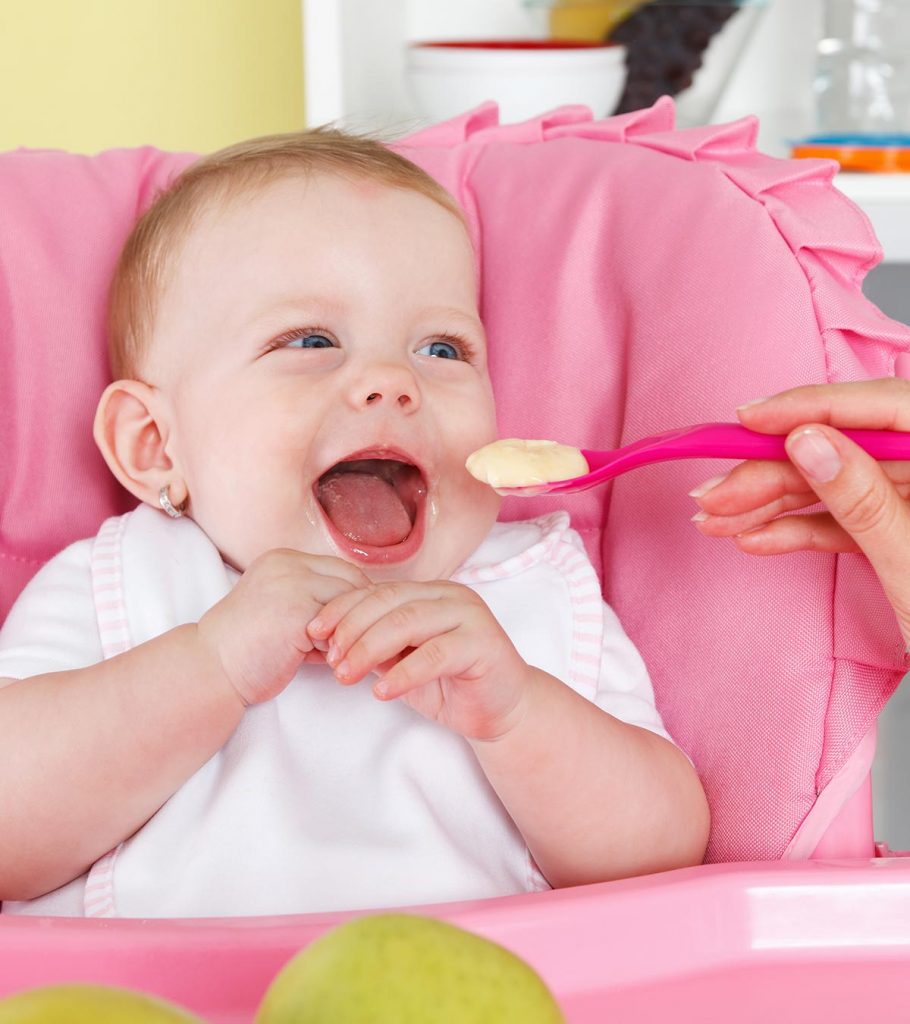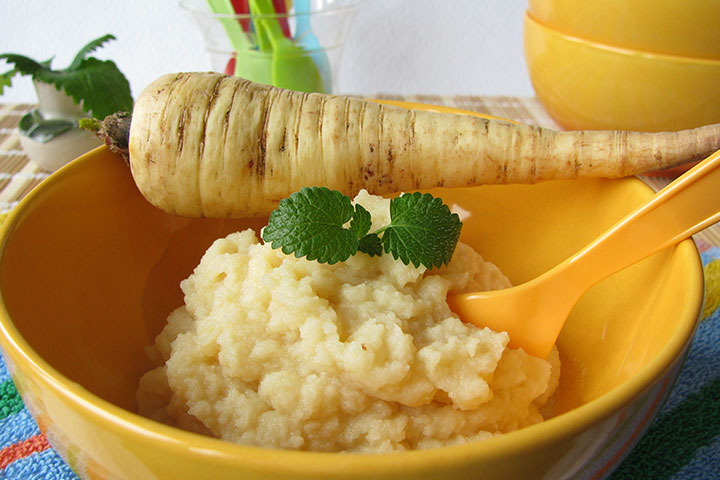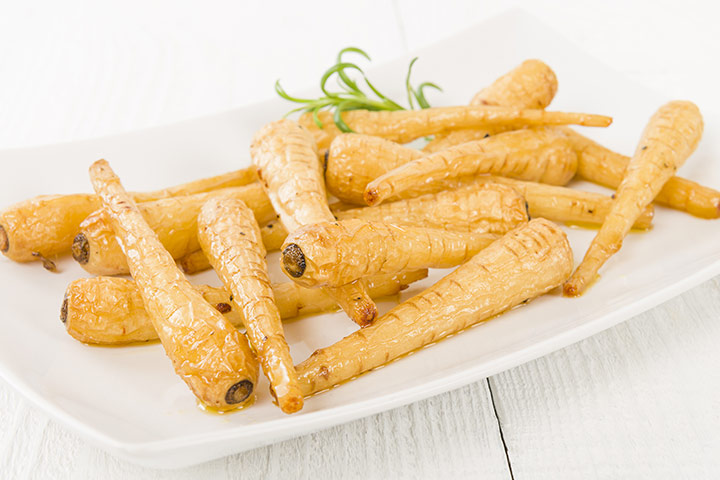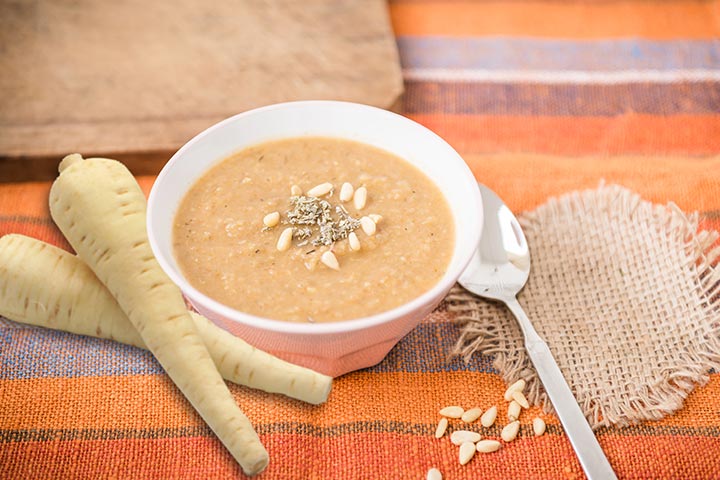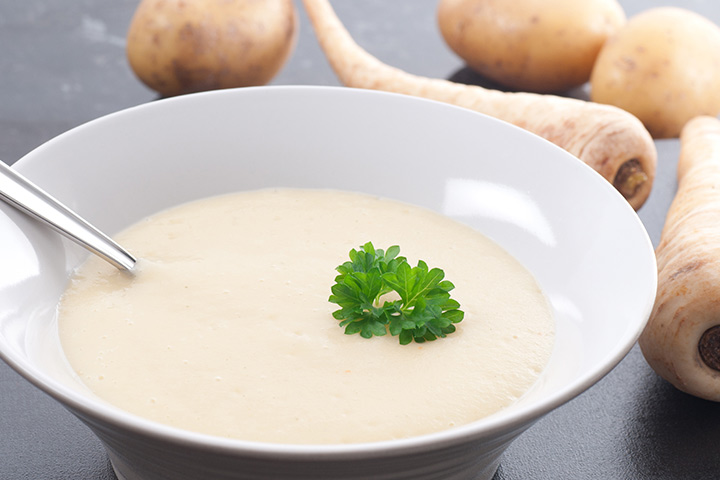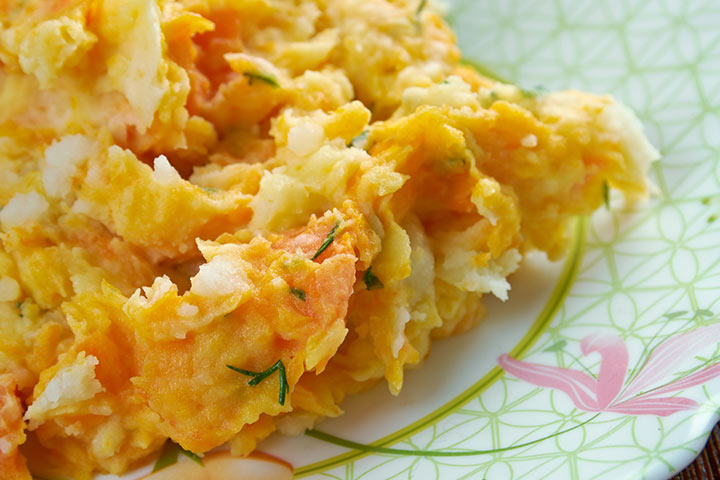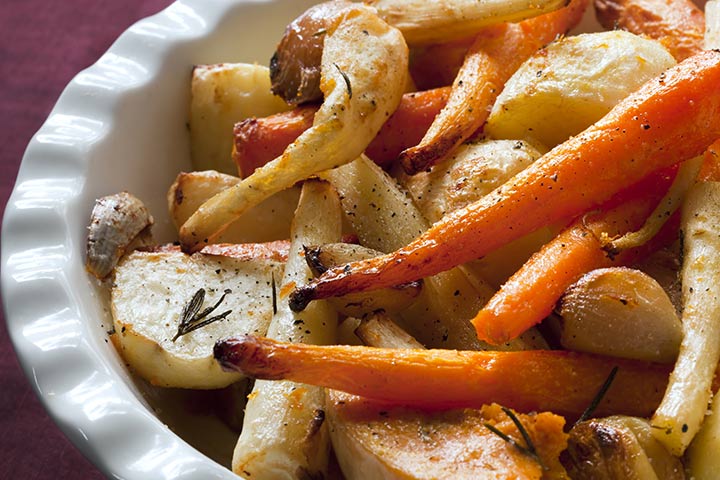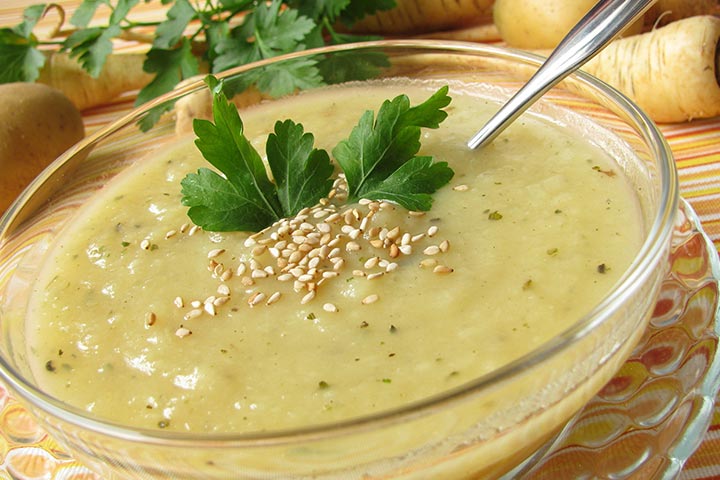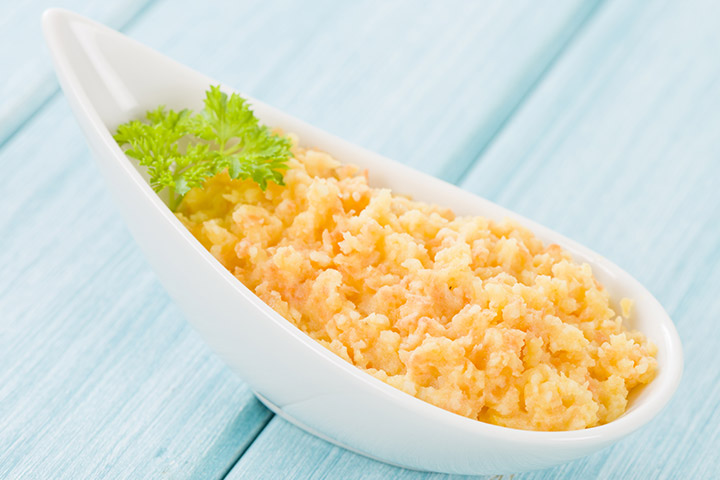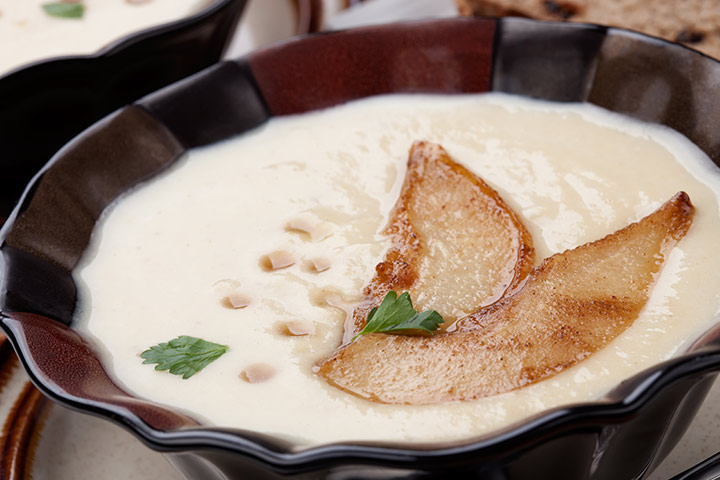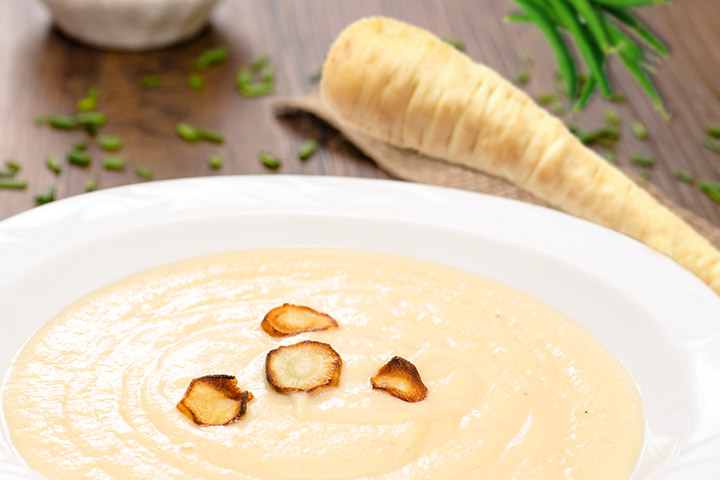If your baby has completed around six months of breastfeeding, you can begin introducing them to solid food. If you are looking for some solid food ideas, try vegetable recipes such as parsnip baby food recipes.
Parsnips are a versatile root vegetable rich in fiber and several nutrients, such as calcium and vitamin C. They can be served as a mash, puree, finger food, or soup. Read on to learn some delicious parsnip recipes that are age-appropriate for your little ones and will stimulate their tiny taste buds.
When Is It Safe To Start Parsnip For Your Baby?
Babies can consume parsnips from around seven months of age as a part of their complementary diet. You can feed the baby one to two teaspoons of cooked parsnip along with other foods and continued breast or formula feeding.
Remember, introduction to solids should be gradual so that the baby gets ample time to adjust to the taste and digestibility of solid foods. So, slowly introduce the baby to the goodness of vegetables and fruits in puree or mashed form. Pureed vegetables are easy to swallow and digest, which helps ensure your baby safely transitions from exclusive breast/formula-feeding to weaning. So initially, serve your baby some soft foods only.
Top Ten Parsnip Baby Food Recipes
Here are ten healthy dishes you can try to make nutritious and delicious baby food. Remember to wash the vegetables and fruits properly.
1. Parsnip Puree:
For this parsnip baby recipes you will need:
- Parsnip
- Water
How To:
- Peel the parsnip and cut it into small pieces. Steam it until tender.
- Add your breast milk or baby formula and mash the parsnip to make a creamy paste.
- Once your baby adjusts to parsnip’s taste and digestibility, combine parsnip puree with other vegetable purees to add variety to your baby’s diet.
An anonymous mother and a blogger share a simple recipe of parsnip and prune puree, which her daughter loves. She says, “This is a great recipe that balances out the constipating properties of potatoes with prunes but doesn’t overwhelm with the taste of prune–which my daughter actually tends to reject. Much to my chagrin. But she does love this mix served with prosciutto baby puree. The recipe…Place the prunes in a bowl of hot water for 30 minutes to rehydrate. Place the parsnips on the bottom rack and set the timer to steam cook for 20 minutes. After 6 minutes, add the potatoes, which will cook for a total of 14 minutes. Once done, add to the blender along with the rehydrated (de-pitted) prunes and blend well with the cooking water (ⅰ).’’
2. Baked Parsnip Finger Food:
For this parsnip recipes for baby you will need:
- Parsnip
- Olive oil
How To:
- Peel the parsnip and cut it lengthwise.
- Place the parsnip pieces on a foil and drizzle a little olive oil over it.
- Bake it at 400 degrees F for 30 minutes. Serve.
- These baked sticks are a good choice for babies practicing baby-led weaning.
3. Baked Parsnip Puree:
You Will Need:
- Parsnip
- Olive oil
- Water
How To:
- Wash the parsnip thoroughly and cut it into small pieces. Place the parsnip on a foil and drizzle a little olive oil over it.
- Bake the parsnip at 400 degrees F until tender.
- Put the baked parsnip in the blender and make a smooth puree. Add water or breast milk to make the consistency creamy.
4. Creamy Parsnip Soup:
You Will Need:
- Butter
- Parsnip (chopped)
- Fresh Coriander (chopped)
- Vegetable stock or water
- Single cream
- Salt – optional
How To:
- Melt the butter in a pan. Add the parsnips and cook until it turns soft.
- Add the vegetable stock and bring it to a boil. Reduce the heat and let it simmer for 30 minutes.
- Put the parsnip along with the soup in a blender and churn. Put it back in the pan and add the cream. Let the soup simmer until it thickens. Add salt and coriander. Serve.
- You can add cheese, dried herbs, and different seasonal veggies to this soup to help your baby develop a taste for vegetable soups.
5. Parsnip Puree With Apple:
You Will Need:
- Parsnip (chopped)
- Apple (chopped)
- Lemon juice
- Salt
- Sugar
How To:
- Preheat the oven to 350 degrees F.
- Boil and mash the parsnip. Add some salt.
- Place the parsnips at the bottom of a gratin dish. Place thin apple slices on top. Repeat the layering. Add lemon juice and sugar on top.
- Bake it for 30 minutes.
6. Parsnip And Sweet Potato Finger Food:
You Will Need:
- Parsnip (chopped)
- Sweet potato (chopped)
How To:
- Steam the parsnips and the sweet potato together.
- Serve as finger food to add variety to the vegetable dishes your baby commonly eats.
7. Parsnip And Sweet Potato Puree:
You Will Need:
- Parsnips (chopped)
- Sweet potato (chopped)
- Water
How To:
- Steam the parsnips and the sweet potato together.
- Transfer the vegetables to a blender and churn. Add a little water to make a smooth puree.
8. Parsnip, Apple And Carrot Mash:
You Will Need:
- Carrots (diced)
- Apple (diced)
- Parsnip (diced)
- Cinnamon Powder
- Water
How To:
- Steam all the vegetables and fruits together until they turn tender.
- Add a pinch of cinnamon.
- Transfer the fruits and vegetables to a blender and add water to make a smooth paste.
- Alternatively, you can mash the vegetables with a fork to make a slightly coarse vegetable mash that older babies can relish with a homemade sauce or dip.
9. Parsnip Chowder:
You Will Need:
- Chicken or vegetable broth
- Parsnip (chopped)
- Onions (chopped)
- Potatoes (chopped)
- Milk
- Yogurt
- Butter
- Breadcrumbs
- Nutmeg Powder
How To:
- Sauté the onions in a pan and keep it aside.
- Boil the potatoes and parsnip in the broth until tender.
- Heat the milk, yogurt and butter in a pan. Now add the breadcrumbs and keep stirring the mix until it thickens. Add the milk mix to the broth.
- Add a pinch of nutmeg powder and let the stew simmer. Now add the onions and cook for a few more minutes.
10. Parsnip With Green Beans:
You Will Need:
- Parsnip (chopped)
- Green Beans (chopped)
- Water
How To:
- Boil the parsnip and beans.
- Add the vegetables along with water or breast milk to a blender and make a smooth puree.
Parsnips are among the most nutritious root vegetables babies can eat after consuming solid foods. Introduce parsnip to babies in a puree form and progress to strict solid based on their comfort level. We have included a few parsnip food recipes for babies in this post. These recipes are quick to prepare and are lightly flavored. Of course, you can always adjust the consistency based on your baby’s tolerance levels. We have also included a few combination parsnip recipes with other vegetables and fruits to help you create nutritious dishes to help babies develop healthy eating habits.
Key Pointers
- Parsnip is a nutritious vegetable that is high in fiber and essential nutrients.
- It can be introduced to babies who are older than six months of age.
- There are various ways to prepare parsnips for babies, including steaming, boiling, baking, and pureeing.
- Pureed parsnips can be used in recipes such as parsnip and sweet potato puree and parsnip and green beans puree as healthy and tasty meal options for babies.
- Parsnip can also be served as soup, finger food, or puree along with other soft vegetables.
Prepare a homemade apple, carrot, and parsnip puree perfect for starting your baby’s food journey at 6 months old.
